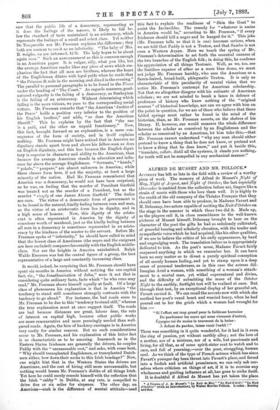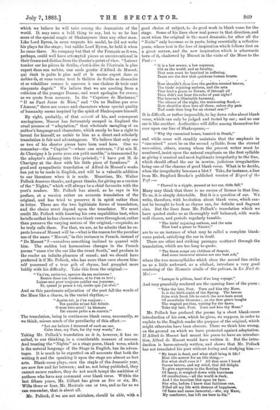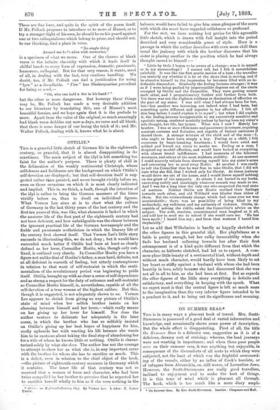ALFRED DE MUSSET AND MR. POLLOCK.*
ACCIDENT has left us late in the field with a review of a worthy piece of work. The memory of Alfred de Mnsset's .Night of May, Night of August, and Night of October, the last especially. (December is omitted from the collection before us), lingers like a. strain of music with those who love them well. It is highly to the credit of the old company of the Theatre Francais that they should once have been able to produce, in Madame Favart and: M. Delannay, two actors capable of reciting the Nuit d' Octobre on the stage in the manner in which those two did it. Made up,. as the players call it, in close resemblance to the well-known pictures of Musset himself, Delaunay brought to bear on the character of the poet the gifts he had so sedulously cultivated, of graceful bearing and scholarly elocution, with the tender and sympathetic voice which he had acquired, like his other qualities, if we are to believe the critics of his early appearances, by hard and ungrudging work. The translation before us is appropriately dedicated to him. As the poet's muse, Madame Favart fairly surpassed anything in which we remember her. It can have been no easy matter so to divest a purely spiritual conception of all merely human feeling, and yet to stamp upon it a deep sense of personal tenderness, as in this case the actress did. Imagine Ariel a woman, with something of a woman's attach- ment to a mortal man, yet withal supernatural and divine, and the difficulty of submitting the muse of the October Night to the earthly, footlight test will be realised at once. But. through that test, by an exceptional display of her graceful art, Favart carried it. ,We can recall the accents now with which she soothed her poet's vexed heart and wearied fancy, when he had poured out to her the griefs which a woman had wrought for him :— "Si l'effort est trop grand pour In faiblesse linmaine De pardooner lea mans qui noes vienuent d'autrui, Epargne.toi du moms le toarment de In 'mine: A defeat du pardon, laisse venir l'onbli !"
There was something in it quite 'wonderful:for it had in it even the ring of passion, yet without earthly alloy; not the love of a mother, nor of a mistress, nor of a wife, but passionate and living, for all that, as of some spirit-sister sent to watch and to care, and full of yearning,—over the poor, struggling, human soul. As we think of the type of French actress which has since Favart's younger day been thrust into Farad's place, and forced into a foolish and artificial prominence, we can only ask our- selves where criticism on things of art, if it is to exercise any wholesome and guiding influence at all, has gone to niche itself.
Itis doubtful if Alfred de Musset has yet taken the place.
• A Version of A. do Mussit's "IA Nuit de Mai." "La lfuit d'Aoili," "La Nutt d'Octobrs" (with in Introduction), by Walter Herrie3 Pollock. London: Bentley and Bon.
which we believe he will take among the dramatists of the world. It may seem a bold thing to say, but to us he has more of the special magic of Shakespeare than any other man. Like Lord Byron, in some respects his model, be did not write his plays for the stage ; but unlike Lord Byron, he held it when he came there. No company but that of the Francais as it was, perhaps, could well have attempted pieces so unconventional in their frame and diction from the theatre's point of view. "Laissez tomber sur lea pieces de Scribe, d'est-h-dire de l'ecrivain le plus expert dans son metier, une seule goutte d'Alfred de Musset, qui &aft is poete le plus naïf et le moins expert dans ce metier-lh, et vous verrez tout le theatre de Scribe se dissoudre et se volatiliser comme le mercnre a une chaleur de trois cent cinquante degres." We believe that we are quoting from a criticism of the younger Dumas, and must apologise for errors, as we quote from memory. In the "Caprices de Marianne," "11 ne Faut Jurer de Bien," and "On ne Badine.pas avec l'Amour," there are scenes and characters whose special quality of humanity seems inspired by the spirit of Shakespeare himself.
By right, probably, of that naiveiti of his, and consequent nnstaginess, Musset has fortunately escaped in. England the cruel process of "adaptation," that wholesale mangling of an author's language and characters, which surely he has a right to
Invent for himself, as unfair to him as a direct and scholarly translation is fair and advantageous. We believe that only one or two of his shorter pieces have been used here. One we remember—the "Caprice "—where one sentence, " J'ai mis M.
de Chavigny h la porte avec son petit menble," is transmuted by the adapter's alchemy into this (printed), "I have put M. de Chavigny at the door with his little piece of furniture." A good and sympathetic translation of Alfred de Musset's works has yet to be made in English, and will be a valuable addition to our literature when it is made. Meantime, Mr. Walter Pollock deserves thanks, and great thanks, for giving us a version of the "Nights," which will always be a chief favourite with the poet's readers. Mr. Pollock has aimed, as he says in his preface, at a version rather an accurate translation of the original, and has tried to preserve it in spirit rather than in letter. There are the two legitimate forms of translation, and the choice must depend upon the translator. We must credit Mr. Pollock with knowing his own capabilities best, when he tells us that he has chosen to use blan k verse throughout, rather than preserve the varying metres of the original,—exquisite, as he truly calls them. For that, we are, as he admits that he ex- pects lovers of Musset will be—what is the reason for the peculiar use of the name "Musset," in this instance in French, instead of "De Musset" P—ourselves something inclined to quarrel with him. The sudden but harmonious changes in the French poems "come o'er the ear like the sweet South," and produce in the reader an infinite pleasure of sound; and we should have preferred it if Mr. Pollock, who has more than once shown him- self possessed of a true gift of rhyme, had grappled more boldly with his difficulty. Take this from the original :—
" Va-t'en, retire-toi, spectre de. ma mattress° ! Rentre dans ton tombeau, si tu t'en es !eve; Laisse-moi pour toujours oublier ma kiln:es:se, Et, quand je pease It toi, croire qua j'ai rAve."
And on this passionate adjuration of the poet fall the words of the Muse like a charm, in the varied rhythm,—
" Apaise-toi, je t'en conjure : • Tea paroles m'ont fait fremir. 0 mon bien-aime ta blessare Est encore prate a se rouvrir."
The translation, being in continuous blank verse, necessarily, as we think, misses much of the peculiarity of this effect :—
"Let me believe I dreamed of such an one. Calm thee, my Poet, for thy very words," Fro.
Taking Mr. Pollock's translation as it is, however, it has re- sulted, to our thinking, in a considerable measure of success. And treating the "Nights" as a stage poem, blank verse, which is the natural language of the Stage in English, has its advan- tages. It is much to be regretted on all accounts that both the writing it and the speaking it upon the stage are almost as lost arts. Blank-verse plays, once the staple of the dramatic year, are now few and far between ; and as, not being published, they cannot secure readers, they do not much tempt the ambition of authors who have any command over blank verse. Within the last fifteen years, Mr. Gilbert has given us five or six, Mr. Wills three or four, Mr. Merivale one or two, and as far as we • can remember, that is about all.
Mr. Pollock, if we are not mistaken, should be able, with a
good choice of subject, to do good work in blank verse for the stage. Some of his lines show real power in that direction, and most when the original is th3 most dramatic, for after all the " Nuits" only becomes so in parts, being essentially a reflective poem, whose text is the loss of inspiration which follows first on a great sorrow, and the new inspiration which is afterwards born of it, shadowed by Musset in the visits of the Muse to the Poet :—
" It is a law severe, a law supreme,
Old as the world, and as fatality, That men must be baptized in suffering.
Tears are the dew that quitkens human hearts.
How shoulda't thou love the garden-scented breeze, The birds' rejoicing anthem, and the arts That lend a grace to Nature, if through all Thou dids't not hear the echo of past sighs ? The heaven's illimitable harmony, The silence of the night, the murmuring flood,— How should'at thou love all those, unless thy pain Had made thee long for an eternal rest ?"
It is difficult, or rather impossible, to lay down rules about blank verse, which can only be judged and tested by ear ; and no one ear is like another. Authorities will differ among themselves for ever upon one line of Shakespeare,—
" Why thy canonized bones, hearsiid in Death,"
and while some will steadily maintain that the emphasis in "canonised" must be on the second syllable, from the eternal necessities, others, among whom the present writer must be numbered, insist upon the natural emphasis on the first syllable
as giving a: musical and most legitimate irregularity to the line, which should offend the ear in nowise, judicious irregularities being one of the charms of good blank verse. What is to decide, when the irregularity becomes a blot P Take, for instance, a line from Mr. Stopford Brooke's published version of Riquet of the Tuft :—
" Flowed in a ripple, paused at her ear, thin fell."
Many may think that there is no excess of licence in that line. To us, it is simply detestable. But it is a question of ear. We write, therefore, with hesitation about blank verse, which can- not be brought to book as rhyme can, for definite and flagrant sins. But the lines from Mr. Pollock's translation which we have quoted strike us as thoroughly well balanced, with words well chosen, and periods regularly tunable.
"The birds' rejoicing anthem, and the arts That lend a grace to Nature,"
are to us an instance of what may be called a complete blank. verse period, satisfying the ear in itself.
There are other and striking passages scattered through the translation, which are too long to quote.
"The finest songs are children of despair, And some immortal strains are one vast sob,"
where the two monosyllables which close the second line strike us as a little awkward, as a sibilant, introduce a very good rendering of the Homeric simile of the pelican, in La Nutt do Mai:— "Lorsque le Oilcan, leasi d'un long voyage.".
And very gracefully rendered are the opening lines of the poem
"Take thy lute, Poet. Turn and kiss thy Muse, It is the birth-night of the Spring. The breeze Stirs with fresh life to catch the new-born scent Of sweetbrier blossoms ; on the first green boughs The wagtail perches, waiting for the dawn. Take thy lute, Poet. Turn and kiss thy Muse."
Mr. Pollock has prefaced the poems by a short blank-verse introduction of his owe, which he gives, we suppose, in order to explain to the English reader the purpose of the original, which might otherwise have been obscure. There we think him wrong, on the ground on which we have protested against adaptation. If Alfred de Musset had meant his poem to have an introduc- tion, Alfred de Musset would have written it. But the intro- duction is harmoniously written, and shows that Mr. Pollock has not translated his poet without loving and studying him :— "My heart is dead, and what shall bring it life? Most idle sorrow for an idle thing,—
But what shall cure it ? All that once I loved Seems barren, and my mind, that did delight To give expression to the fleeting forms Of fancy, is weighed down with heaviness Of recollection,—all the world is dark, And I the heaviest blot upon its face. She who, before I knew that faithless one, Filled all my life with dreams of happiness, Of fame and name immortal,—she, my Muse, My comforter, has left me here to die."
These are fine lines, and quite in the spirit of the poem itself. If Mr. Pollock proposes to introduce us to more of Alusset, or to try a stronger flight of his own, he should be on his guard against OL10 or two colloquialisms which belong to prose, and should not, to our thinking, find a place in verse.
"No single thing Around me but's alive with memories," is a specimen of what we mean. One of the charms of blank verse is the infinite elasticity with which it lends itself in -skilful hands to every form of expression, dramatic, passionate, . humorous, colloquial. But for that very reason, it wants, most of all, in dealing with the last, very cautious handling. We doubt, too, if Mr. Pollock can find a justification for using -"
lyre" as a dissyllable. " Fire " has Shakespearian precedent for being so used,—
"Oh, who can hold a Ere in his band ? " but the other is more dangerous. But however these things may be, Mr. Pollock has made a very desirable addition to our literature by translating this, one of Musset's most beautiful fancies, and we hope again that it is the prelude to snore. Apart from the value of the original, so much amazingly bad blank verse dribbles out now-a-days, no verse and all blank, -that there is some danger a our losing the trick of it ; and Mr. Walter Pollock, dealing with it, knows what he is about.




































 Previous page
Previous page